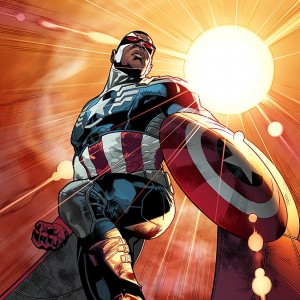Rick Remender and Tom Brevoort speak on Falcon becoming Cap, what’s next for Steve Rogers and more!
Robbed of his superior strength and vitality, Steve Rogers must surrender his blues for a sturdy cane. He’s not about to fade away just yet though. The old maxims hold true: If dead men declared the war and old men talk about it, a young man must rise and continue the fight. If Steve Rogers can no longer hurl his mighty shield, then he’ll hand it to one who can carry it across the battlefield, above the clouds, to greater heights than ever before.
This fall, Sam Wilson flies where eagles dare, as the intrepid Falcon assumes his new role as Captain America.
A new chapter begins in ALL-NEW CAPTAIN AMERICA #1 by Rick Remender and Stuart Immonen.
“This is it,” says Remender of the culmination of two years of storytelling in CAPTAIN AMERICA and the dawning of ALL-NEW CAPTAIN AMERICA. “This is the fireworks factory we’re arriving at, and now everything’s going to blow up and be very pretty and exciting to look at. It leads into an evolution of Steve Rogers’ character that I had very early when I was given the job. I think that it’s important with these stories to do things that are natural and make sense and have an inherent logic to the universe, but are also constantly shifting and exciting, keeping the drama high. In order to do that it really comes down to creating new dynamics. I’ve been having a lot of fun writing Sam. It’s a completely different attitude. The fact that he’s not a soldier shifts things up a bit. Sam’s not going to be Steve. Steve can be very rigid. That can be kind of joyless at times, whereas Sam is absolutely not that.”
“While Sam shares many of Steve’s beliefs in a general sense, he’s also a very different person with a very different background,” adds editor Tom Brevoort, “He didn’t grow up in the 1930s, he’s a modern day man in touch with the problems of the 21st Century. For most of his professional life, Sam has worked as a social worker, so he’s seen the worst of urban society up close, and how crime, poverty, lack of social structure and opportunity can affect the community. So he’s got perhaps a greater focus on the plight of the common man, and perhaps a greater empathy for the underprivileged than maybe even Steve himself. He’s also not a military man, so he’s more apt to be instinctively skeptical of any situation that calls for just following orders. Sam, like Steve, will be led by his personal morality and beliefs as to what is right and what is wrong—and where his beliefs may differ in their shading from those of the previous Cap are where the interesting stories will be found.”
Remender paints a picture of Sam’s specially designed suit, incorporating the wings of the Falcon persona while still bearing the unmistakable stars and stripes of the Captain America role:
“Historically, Falcon would often act as air support, flying Steve into the battle. Why not merge the two? He pops the wings, and as he flies, he keeps the shield latched onto his back. He dives down onto the scene, hurls the shield, wings retract, and rolls into a kick or jump, catches the shield on the way back. He doesn’t have the super soldier serum, but he has the added zing-zang-zoom of flight.”
Despite the edge provided by Captain America’s newfound aptitude for altitude, he faces a daunting challenge from a deeply entrenched opposition. The terrorist organization Hydra grows in power and influence, infiltrating the Marvel Universe completely. With Steve Rogers seemingly down for the count, his enemies rally to seize upon a vulnerable America.
Fortunately, Wilson doesn’t face these threats alone. Ian, Steve’s adopted ward from Dimension Z and the artificial son of Arnim Zola, takes up the storied mantle of Nomad. Meanwhile, Steve himself, physically aged but sharp as ever, serves as tactician back at the base.
“Steve’s spirit is as willing as ever,” explains Brevoort. “But his body is no longer up to the task of being Captain America. So he’ll instead employ his skills as the new Cap’s remote strategic advisor, running missions from his headquarters in Avengers Mansion and providing Sam with technical support and field information from a distance. He’ll also tutor Sam in how to throw the shield, a skill that’s deceptively difficult for the new Cap to master. So Steve will continue to be a vital part of the series moving ahead. And Steve is completely supportive of Sam as his hand-picked successor—the only replacement Captain America ever to be chosen by Steve himself. Steve and Sam are effectively brothers-in-arms, and there’s a level of trust and camaraderie between them that’s matched only by that of soldiers who’ve fought shoulder-to-shoulder in foxholes on the battlefield. I think that different characters across the Marvel Universe are going to respond to Sam’s appointment in different ways. But he’s not a novice—in his long history as the Falcon, he’s earned a reputation for integrity and honesty and backbone that most of the super hero community have a respect for. On the villain side, there may be those who feel that their jobs will be easier now that a different man is carrying the shield, so it will be Sam’s mission to disabuse them from that notion.”
Of course, Sam assumes this responsibility just as a female Thor comes to prominence. But will that be the end of the changes to the very face of Earth’s Mightiest Heroes?
“We’re not anywhere near finished,” says Brevoort. “Change is one of the watchwords of the Marvel Universe, so there are even more startling surprises to come!”


